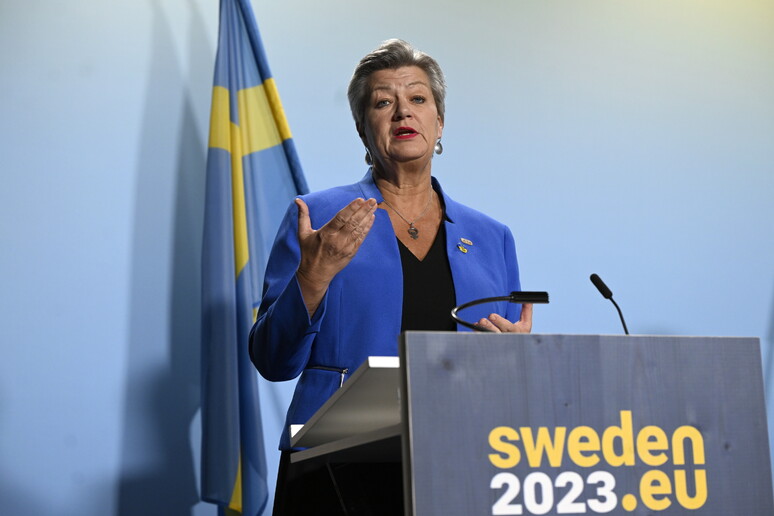by enr correspondents With rising migration numbers putting pressure on the EU, the heads of state and government of the Member Countries are expected in Brussels next week to discuss this matter, among others. On Tuesday, EU Home Affairs Commissioner Ylva Johansson discussed border walls, the Schengen area, the Dublin Regulation and the new pact on migration with the enr correspondents.
PRESSURE.
The EU is currently facing high numbers of migrants into the bloc. In an interview on Tuesday, EU Home Affairs Commissioner Ylva Johansson told enr-correspondents that last year saw a "steep increase", with 330,000 irregular arrivals coming from countries such as Turkey, India, Cuba, Egypt and Morocco.
At the same time, nearly 1 million people applied for asylum in the EU, the commissioner said. According to Johansson this was putting pressure on some member states, such as Belgium and the Netherlands.
For next week's special summit, the EU heads of state are expected in Brussels to discuss some of the open questions surrounding migration into the EU. There are some sticking points likely to play a role.
BORDER FENCES FINANCED FROM EU FUNDS? One of the points of debate will probably be the financing of fences from the EU budget. Johansson stated in the interview that the EU was financing border protection, but "that building walls and barbed wires around [the] European Union is not a good solution for many reasons." "We have a long-standing principle of not financing walls and barbed wires. And I think that should not be changed. But I also think that we should have a pragmatic approach. Of course the majority of financing for border protection comes from the national budget and we should focus on what we can do best with the EU money," Johansson added.
At the same time, the commissioner did not rule out that "physical infrastructure" at the external borders could be financed from the EU budget. This could be technology for border surveillance, for example.
However, in the fall of 2021, more than ten EU states had already demanded from the EU Commission that physical border barriers should be paid from the common budget, at least in part. Back then, the Brussels authority had firmly rejected this. Most recently, Austria's Chancellor Karl Nehammer demanded 2 billion euros from the Commission for the expansion of the border fence between Bulgaria and Turkey.
SCHENGEN AND INTERNAL BORDER CHECKS.
In the free travel Schengen area, there are currently border checks in place between its members, for example on the Austrian-Slovenian border.
"We need to get rid of the internal border checks," Johansson said in that regard. The EU Commission was reaching out to the concerned member states and their neighbors in order to find ways to prevent irregular arrivals as well as to protect the countries from security risks without internal border checks, she added.
At a meeting with his Dutch counterpart Mark Rutte on January 26 in Vienna, Austrian Chancellor Karl Nehammer said that the border controls currently in place between Germany, Austria, the Czech Republic, Slovakia, Hungary and Slovenia showed that the Schengen system of open borders was failing.
ENFORCEMENT OF THE DUBLIN REGULATION AND SCHENGEN.
In her interview with the correspondents, Johansson stressed the importance of a well-functioning Schengen area, which would also include an effective registration of people entering the bloc.
"I'm concerned about the situation where in Austria, for example, 75% of the irregular arrivals there have not been registered before they turn up in Austria. In the Netherlands it's 90% of the irregular arrivals that turn up there that have not been registered before," she said.
The EU's Dublin Regulation provides for migrants to be returned to the country where they first entered the bloc and for their asylum requests to be handled there. The regulation puts great pressure on Greece, Italy, Spain and Malta, due to the high volume of arrivals via the Mediterranean Sea.
For years, southern EU states have charged fellow bloc members with a lack of solidarity, as many refuse to take in a fixed share of some of the tens of thousands of migrants that reach the EU each year.
At the Vienna meeting on January 26, the Dutch Prime Minister MarkRutte demanded that the registration of migrants at the EU's external borders, as provided for by the Dublin Regulation, should be restored with as few gaps as possible.
ACCESS TO SCHENGEN AREA.
On Tuesday, Johansson confirmed that Romania and Bulgaria were fulfilling all criteria to enter the Schengen area. She was confident that there would be a decision on the access of Romania and Bulgaria "pretty soon." Austria had vetoed Bulgaria's and Romania's Schengen accession at the end of 2022 because of irregular migration across their external EU borders.
NEW PACT ON MIGRATION AND ASYLUM.
In Tuesday's interview, Commissioner Johansson said that there was "a good progress" on the legislative package. Johansson was confident that all aspects of the pact would be "decided during this mandate." The term of the current EU Commission is due to end 2024. At the same time, the Commissioner warned that "it will still take some years before everything is implemented." In September 2020, the EU Commission had proposed a so-called new "Pact on Migration and Asylum." This came after it transpired in 2015/2016 that the current system, as well as the mandatory distribution of refugees among the member states, wasn't working.
Another central issue is the repatriation of migrants without the right to stay. EU interior ministers already discussed the topic last week. This debate is likely to continue at the upcoming summit.
On January 26, EU Commission President Ursula von der Leyen wrote a letter to the EU heads of state and government, in which she presented her proposals for short-term success in migration policy. Among other things, she emphasized the protection of external borders, faster repatriations and the complete registration of migrants who reach the EU.
ALL RIGHTS RESERVED © Copyright ANSA











